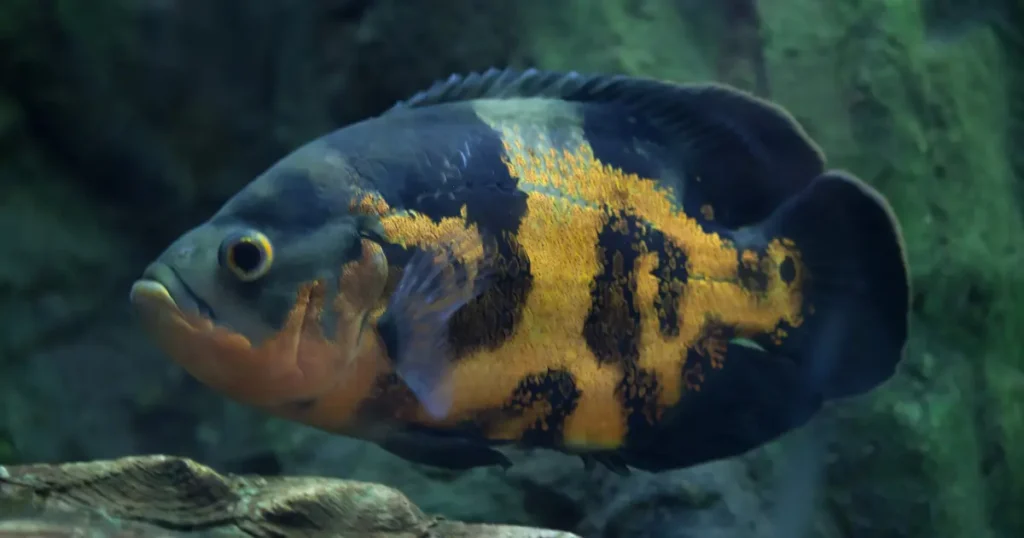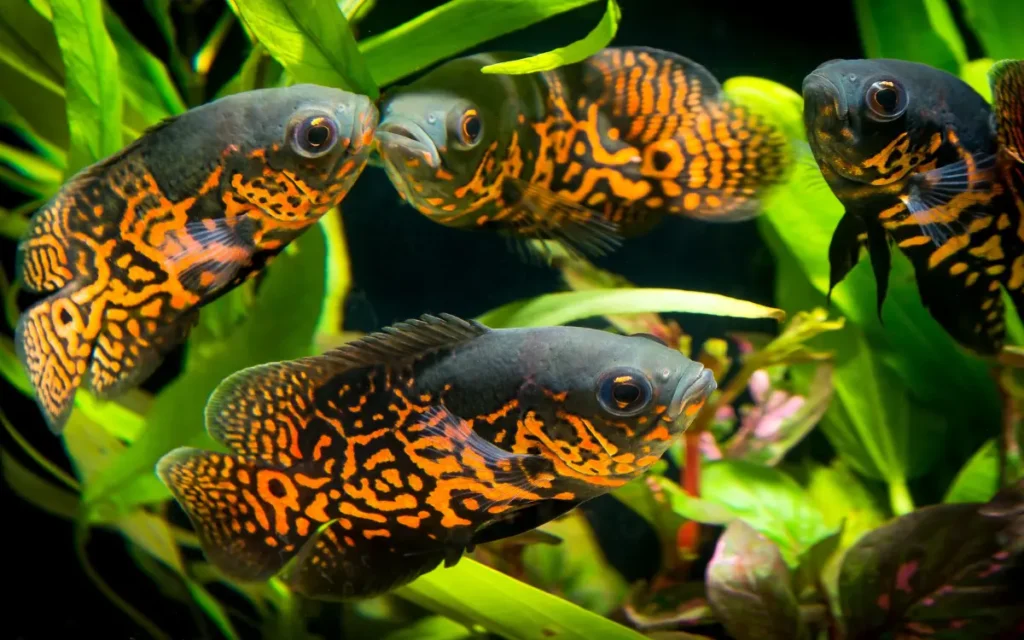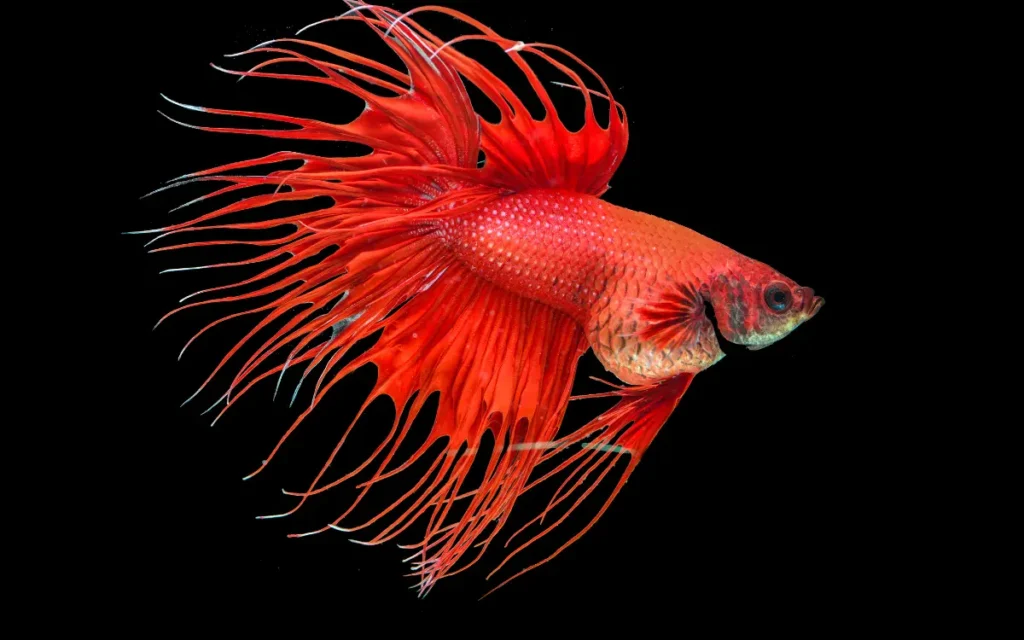The Oscar fish is not just another large cichlid. It is one of the most intelligent and interactive freshwater fish you can keep. Many aquarists describe Oscars as having dog-like personalities because they recognize their owners, respond to routines, and show clear behavior patterns. At the same time, they are powerful, messy, and territorial fish that demand proper planning.
This guide is written to help you decide whether an Oscar fish is right for your tank and, if so, how to keep it healthy long term. Oscars are often purchased small and cute, but problems start when their adult needs are ignored. If you want success with Oscars, space, filtration, and understanding their behavior matter more than anything else.
Oscar Fish Species Profile
| Characteristic | Details |
|---|---|
| Common Name | Oscar Fish |
| Scientific Name | Astronotus ocellatus |
| Origin | South America |
| Adult Size (Aquarium) | 12–14 inches |
| Adult Size (Wild) | Up to 18 inches |
| Lifespan | 10–15 years |
| Temperament | Aggressive, territorial |
| Minimum Tank Size | 75 gallons (single Oscar) |
| Water Temperature | 74–81°F (23–27°C) |
| pH Range | 6.5–7.5 |
| Water Hardness | 5–20 dGH |
| Diet | Omnivore (high protein preference) |
Natural Habitat and Distribution

Oscar fish are native to the Amazon Basin in South America. They are commonly found in Brazil, Peru, Colombia, and Argentina. In the wild, Oscars live in slow-moving rivers, floodplains, and shallow lakes where the water is warm and often murky.
Their natural environment is filled with submerged tree roots, fallen branches, and soft substrates. These features create natural boundaries and hiding places. This explains why Oscars in aquariums enjoy rearranging décor and establishing territories. They are not open-water swimmers by nature; they prefer structure and control over their surroundings.
Understanding this habitat helps explain why Oscars struggle in bare, brightly lit tanks with strong currents.
Physical Characteristics and Color Varieties
Oscars are thick-bodied, muscular fish with large mouths and powerful jaws. Even at a young age, they grow quickly. Many new keepers underestimate how fast an Oscar can outgrow a tank.
Common Oscar Varieties
- Tiger Oscar: Orange and black pattern, the most common type
- Albino Oscar: White or pale yellow body with red eyes
- Red Oscar: Deep red body with dark edging
- Lutino Oscar: Light base color with red and gold tones
Color intensity depends heavily on diet, water quality, and stress levels. A stressed Oscar will quickly lose vibrancy.
Oscar Fish Intelligence and Personality

Oscar fish are known for their intelligence more than almost any other aquarium fish. They quickly learn feeding schedules and often follow their owners along the glass. Some will even allow gentle interaction during feeding.
Real experience: Oscars show clear mood changes. A healthy Oscar actively patrols its tank, investigates movement, and responds to feeding cues. When an Oscar becomes inactive or hides constantly, something is usually wrong.
This intelligence also means they become bored in poorly structured tanks. Providing enrichment through décor changes and interaction improves their well-being.
Behavior and Temperament
Oscars are territorial and aggressive, especially as they mature. Juveniles may appear calm, but behavior often changes as they grow.
Key behavior traits include:
- Strong territorial instincts
- Aggression toward smaller fish
- Rearranging substrate and décor
- Pair bonding during breeding
They should never be treated like peaceful community fish. Mixing Oscars with unsuitable tank mates is one of the most common reasons for losses.
Ideal Tank Setup for Oscar Fish
Tank Size Matters More Than Anything
A single Oscar needs at least 75 gallons. For a pair, 125 gallons or more is required. Bigger is always better. Cramped tanks cause aggression, stunted growth, and poor water quality.
Tall tanks are less important than footprint. Oscars need turning space and horizontal swimming room.
Filtration and Water Quality
Oscars produce heavy waste. Weak filtration is not optional.
- Use a high-capacity canister filter or sump
- Aim for strong biological filtration
- Supplement with mechanical filtration for debris
Weekly water changes of 25–40% are normal for Oscar tanks.
Substrate and Decorations
Sand or smooth gravel works best. Avoid sharp stones. Oscars are known to dig and can injure themselves.
Decor tips:
- Large driftwood pieces
- Heavy rocks placed securely
- Minimal decorations to preserve swimming space
Expect decorations to move. Oscars like to redecorate.
Lighting
Moderate to low lighting works best. Bright lights can stress Oscars. If plants are used, choose hardy species and anchor them well.
Water Parameters and Stability
Oscars are tolerant but not careless fish. Stability matters more than exact numbers.
- Temperature: 74–81°F
- pH: 6.5–7.5
- Hardness: 5–20 dGH
Sudden parameter swings are dangerous, especially temperature drops.
Feeding and Diet
Oscar fish are omnivores but lean heavily toward protein-based foods.
Staple Diet
- High-quality cichlid pellets or sticks
- Large, slow-sinking foods
Supplemental Foods
- Shrimp
- Earthworms
- Mealworms
- Crickets
- Frozen fish fillets
Vegetables like peas or zucchini can be offered occasionally.
Feeding Schedule
Feed once or twice daily. Oscars are enthusiastic eaters and will beg constantly. Overfeeding leads to water problems and obesity.
Important warning: Avoid feeder fish. They often carry parasites and disease.
Oscar Fish Tank Mates
Choosing tank mates for Oscars requires planning and space.
Suitable Tank Mates
- Jack Dempsey cichlids
- Firemouth cichlids
- Large Silver Dollars
- Large Plecostomus species
- Bichirs
All tank mates must be similar in size and temperament.
Fish to Avoid
- Small community fish
- Fin-nippers
- Slow or delicate species
Even compatible tank mates require close monitoring.
Common Oscar Fish Behavior Problems
Oscar Fish Hiding Constantly
Usually caused by:
- Stress
- Poor water quality
- Inadequate tank size
Check parameters and ensure proper filtration.
Oscar Fish Aggression Spikes
Often linked to:
- Maturity
- Tank overcrowding
- Breeding behavior
Adding space or removing tank mates may be necessary.
Oscar Fish Not Eating
Short fasting periods are normal. Long refusal usually indicates stress or illness.
Breeding Oscar Fish
Oscars are monogamous and form strong pair bonds.
How Oscars Breed
- Pairs clean a flat surface
- Eggs are laid and guarded
- Both parents protect fry
Breeding Conditions
- Tank size: 100 gallons minimum
- Temperature: 78–82°F
- Flat rocks or slate surfaces
Oscar parents are excellent caregivers but extremely aggressive during spawning.
Raising Oscar Fry
Oscar fry are large compared to other cichlids but still require careful feeding.
- Start with infusoria or liquid fry food
- Transition to crushed flakes
- Increase food size as they grow
Frequent water changes are critical during this stage.
Common Health Issues in Oscar Fish
Hole-in-the-Head Disease (HITH)
Often linked to:
- Poor diet
- Poor water quality
- Long-term stress
Improve filtration and diet immediately.
Ich
White spots on body and fins. Treat early with temperature adjustments and medication.
Bacterial Infections
Open wounds from fighting can become infected quickly.
Internal Parasites
Symptoms include weight loss and lethargy despite eating.
Are Oscar Fish Good for Beginners?
Honestly, Oscars are not ideal for beginners unless the keeper is prepared for:
- Large tanks
- Heavy filtration
- Regular maintenance
They are forgiving of minor mistakes but punish neglect quickly.
Why Choose an Oscar Fish?
People choose Oscars because:
- They recognize their owners
- They show complex behavior
- They live long lives
- They become true centerpiece fish
If you want interaction rather than decoration, Oscars deliver.
Final Thoughts
Oscar fish are demanding but deeply rewarding. They are not fish you add casually. When given space, stable water, and proper care, they develop strong personalities and become the focal point of any aquarium. If you cannot commit to large tanks and consistent maintenance, Oscars are not the right choice. If you can, few freshwater fish compare.

 **2. Platy** Platies are hardy and easygoing. They enjoy swimming in groups and come in a variety of bright colors. Great for peaceful community tanks. ➡️ [Platy Fish Guide →](#) **3. Zebra Danio** Known for their energy and toughness, zebra danios are perfect for cycling new tanks. They tolerate a wide range of conditions and like to dart around in groups. ➡️ [Zebra Danio Guide →](#) **4. Corydoras Catfish** Peaceful bottom-dwellers that help keep your tank clean. Keep them in groups of 3 or more and give them soft substrate. ➡️ [Cory Catfish Care →](#) **5. Molly** Adaptable to various water conditions (even brackish), mollies are lively and great for community aquariums. ➡️ [Molly Fish Care Guide →](#) **6. Swordtail** Easy to care for and great in peaceful groups. Males have a signature sword-like tail and love swimming space. ➡️ [Swordtail Fish Guide →](#) **7. Betta Fish** Low-maintenance and visually stunning. Best kept alone or with very peaceful tank mates like snails or Corydoras. ➡️ [Full Betta Fish Care Guide →](#) **8. Neon Tetra** Small and peaceful, neon tetras love to school and light up a planted tank. Keep them in groups of 6 or more. ➡️ [Neon Tetra Care Guide →](https://oceanbitez.com/neon-tetras/) **9. Harlequin Rasbora** A calm and schooling species that fits right into community setups. Easy to feed and care for. ➡️ [Harlequin Rasbora Guide →](#) **10. Dwarf Gourami** A gentle and colorful addition to a beginner’s tank. Likes planted environments and peaceful neighbors. ➡️ [Dwarf Gourami Guide →](#) **11. White Cloud Mountain Minnow** Can live in cooler temperatures and is perfect for unheated tanks. Small, peaceful, and easy to care for. ➡️ [White Cloud Minnow Guide →](#) **12. Cherry Barb** Peaceful and social, cherry barbs do well in planted tanks and enjoy being in small groups. ➡️ [Cherry Barb Care →](#) --- ### Sample Beginner Tank Combos **Combo 1: 10–15 Gallon Easy Starter** * 4–6 Guppies * 3 Corydoras Catfish * 1 Nerite Snail **Combo 2: 20 Gallon Planted Community** * 6 Harlequin Rasboras * 6 Neon Tetras * 1 Dwarf Gourami * 3 Otocinclus (optional if algae control is needed) --- ### Beginner Tips for a Successful Aquarium * Cycle your tank before adding fish (ammonia → nitrite → nitrate) * Start with hardy species before delicate ones * Feed small amounts once or twice daily * Do weekly partial water changes (20–30%) * Don’t mix aggressive or fin-nipping species * Use a heater for tropical fish (75–80°F) --- ### Final Thoughts These beginner fish are ideal for getting started in the hobby without frustration. They're low-maintenance, compatible, and fun to watch. Once you’re comfortable, you can explore more advanced species and community combinations. ➡️ Check out our full guide to [Freshwater Aquarium Fish →](https://oceanbitez.com/freshwater-fish/)](https://oceanbitez.com/wp-content/uploads/2024/06/Best-Freshwater-Fish-for-Your-Aquarium-1024x640.webp)
